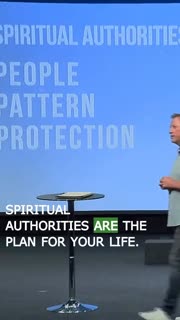Embracing Spiritual Authority: Lessons from the Centurion
Summary
### Summary
Good morning, everyone. It's a joy to be here at Bellevue Christian Center, a place that holds a special place in my heart. Today, I want to talk about the role of spiritual authority in our lives, drawing from Luke 7, where Jesus heals the servant of a Roman centurion. This centurion, a man of authority himself, recognized the divine authority in Jesus and believed that Jesus could heal his servant with just a word. This story illustrates the importance of spiritual authority and how it operates in our lives.
Spiritual authorities are people just like us, with their own strengths and weaknesses. They are not perfect, but they are chosen by God to lead us. The centurion's love for his servant, despite societal norms, shows that true leaders care deeply for those they lead. However, they also make mistakes, and it's crucial to understand that their humanity doesn't disqualify them from their role.
Spiritual authorities serve as patterns or examples for us. Their lives, including their mistakes and painful moments, teach us valuable lessons. The centurion's humility in admitting his mistake and changing his approach to Jesus is a powerful example of accountability and humility.
Spiritual authorities also provide protection. They stand as a barrier between us and the enemy, often facing spiritual warfare on our behalf. This protection is a divine setup, and we should appreciate and respect it. The centurion built a synagogue for the Jews, showing his commitment to protecting their faith.
Lastly, spiritual authorities are part of God's plan for our lives. They are placed over us to guide and lead us, and our response to their leadership is a reflection of our obedience to God. The centurion's recognition of Jesus' authority and his faith in Jesus' word exemplify the kind of respect and trust we should have in our spiritual leaders.
In conclusion, spiritual authorities are a gift from God. They are not perfect, but they are perfectly placed in our lives to lead us, protect us, and serve as examples. Let's honor and respect them as we follow their lead, knowing that they are part of God's divine plan for our lives.
### Key Takeaways
1. Spiritual Authorities Are Human: Spiritual leaders are people with their own strengths and weaknesses. They care deeply for those they lead but are also prone to making mistakes. Understanding their humanity helps us to extend grace and appreciate their efforts in guiding us. [01:17:56]
2. Leaders as Patterns: Spiritual authorities serve as examples through their entire lives, not just their words. Their humility, accountability, and even their mistakes teach us valuable lessons. The centurion's humility in admitting his mistake and changing his approach to Jesus is a powerful example of accountability and humility. [01:20:42]
3. Protection Through Authority: Spiritual leaders provide a divine layer of protection over our lives. They often face spiritual warfare on our behalf, standing as a barrier between us and the enemy. This protection is a divine setup, and we should appreciate and respect it. [01:24:24]
4. Respecting the Process: Achieving spiritual authority involves a rigorous process that ensures leaders are well-prepared to guide us. This process is essential for maintaining integrity and accountability. Disrespecting this process undermines the value of spiritual leadership. [01:11:29]
5. God's Plan for Authority: Spiritual authorities are part of God's divine plan for our lives. Our response to their leadership reflects our obedience to God. The centurion's recognition of Jesus' authority and his faith in Jesus' word exemplify the kind of respect and trust we should have in our spiritual leaders. [01:30:24]
### YouTube Chapters
[0:00] - Welcome
[57:43] - Introduction and Personal Reflections
[58:21] - Remembering Pastor Gary Hoyt
[59:00] - Purpose Driven Life Illustration
[01:00:17] - The Role of Spiritual Authority
[01:01:30] - The Story of the Centurion
[01:04:21] - Jesus Heals and Our Faith
[01:05:43] - Invitation for Healing Prayer
[01:06:45] - Honoring Our Ministers
[01:08:19] - The Importance of Connection
[01:10:22] - Addressing Isolation in Ministry
[01:12:01] - Respecting the Process of Spiritual Authority
[01:13:15] - Spiritual Authorities Are People
[01:17:56] - Leaders as Patterns
[01:20:42] - Protection Through Authority
[01:24:24] - The Plan for Spiritual Authority
[01:30:24] - Recognizing Divine Authority
[01:32:45] - Personal Reflections on Leadership
[01:39:02] - Closing Prayer and Reflections
Study Guide
### Bible Study Discussion Guide
#### Bible Reading
- Luke 7:1-10 (CEV): The story of Jesus healing the servant of a Roman centurion.
#### Observation Questions
1. What was the centurion's initial request to Jesus, and how did he communicate it? ([01:02:44])
2. How did the centurion demonstrate his understanding of authority when he spoke to Jesus? ([01:02:44])
3. What was Jesus' reaction to the centurion's faith, and how did He respond? ([01:04:21])
4. What actions did the centurion take that showed his care for his servant, despite societal norms? ([01:13:15])
#### Interpretation Questions
1. Why do you think the centurion felt unworthy for Jesus to come to his house, and what does this reveal about his character? ([01:02:44])
2. How does the centurion's recognition of Jesus' authority compare to the faith of others in Israel, according to Jesus? ([01:04:21])
3. In what ways do spiritual authorities serve as patterns or examples for us, based on the centurion's actions and humility? ([01:20:42])
4. How does the concept of spiritual authority providing protection manifest in the story of the centurion and his servant? ([01:24:24])
#### Application Questions
1. Reflect on a time when you had to trust a spiritual authority in your life. How did you respond, and what was the outcome? ([01:30:24])
2. The centurion showed great humility and accountability by admitting his mistake. How can you practice humility and accountability in your own life, especially in your interactions with spiritual leaders? ([01:20:42])
3. Spiritual authorities are human and make mistakes. How can you extend grace to your spiritual leaders when they falter, and why is this important? ([01:17:56])
4. Think about the ways your spiritual leaders have provided protection or guidance in your life. How can you show appreciation and respect for their efforts? ([01:24:24])
5. The centurion's faith in Jesus' word was unwavering. How can you cultivate a similar level of faith and trust in the spiritual authorities God has placed in your life? ([01:30:24])
6. How can you actively support and pray for your spiritual leaders, knowing the spiritual warfare they often face on behalf of their congregation? ([01:25:06])
7. Reflect on the rigorous process of achieving spiritual authority mentioned in the sermon. How can you respect and honor this process in your church community? ([01:11:29])
Devotional
Day 1: Embracing the Humanity of Spiritual Leaders
Spiritual leaders are human beings with their own strengths and weaknesses. They care deeply for those they lead but are also prone to making mistakes. Recognizing their humanity helps us to extend grace and appreciate their efforts in guiding us. Just as the Roman centurion showed love and care for his servant, true leaders demonstrate their commitment to those they lead, even when societal norms might suggest otherwise. Understanding that spiritual authorities are not perfect allows us to see their genuine efforts and the heart behind their leadership.
By acknowledging the humanity of our spiritual leaders, we can better support them in their roles. This perspective encourages us to pray for them, offer them grace, and understand that their mistakes do not disqualify them from their God-given roles. Instead, it highlights the importance of community and mutual support within the body of Christ. [01:17:56]
1 Timothy 5:17-18 (ESV): "Let the elders who rule well be considered worthy of double honor, especially those who labor in preaching and teaching. For the Scripture says, 'You shall not muzzle an ox when it treads out the grain,' and, 'The laborer deserves his wages.'"
Reflection: Think of a time when you were disappointed by a spiritual leader. How can you extend grace and support to them, recognizing their humanity and the weight of their responsibilities?
Day 2: Learning from Leaders' Lives
Spiritual authorities serve as examples through their entire lives, not just their words. Their humility, accountability, and even their mistakes teach us valuable lessons. The centurion's humility in admitting his mistake and changing his approach to Jesus is a powerful example of accountability and humility. Leaders' lives, including their painful moments, provide us with a pattern to follow, showing us how to navigate our own spiritual journeys with integrity and grace.
By observing the lives of our spiritual leaders, we can learn how to handle our own challenges and mistakes. Their transparency and willingness to admit faults can inspire us to do the same, fostering a culture of honesty and growth within our community. [01:20:42]
Hebrews 13:7 (ESV): "Remember your leaders, those who spoke to you the word of God. Consider the outcome of their way of life, and imitate their faith."
Reflection: Reflect on a specific lesson you have learned from observing a spiritual leader's life. How can you apply this lesson to your own spiritual journey today?
Day 3: The Protective Role of Spiritual Authority
Spiritual leaders provide a divine layer of protection over our lives. They often face spiritual warfare on our behalf, standing as a barrier between us and the enemy. This protection is a divine setup, and we should appreciate and respect it. The centurion's commitment to building a synagogue for the Jews demonstrates his dedication to protecting their faith and well-being, illustrating the protective role that spiritual authorities play in our lives.
Understanding the protective role of spiritual leaders helps us to value their presence and the spiritual battles they fight on our behalf. It encourages us to pray for their strength and wisdom, recognizing the significant impact they have on our spiritual well-being. [01:24:24]
Ephesians 6:12-13 (ESV): "For we do not wrestle against flesh and blood, but against the rulers, against the authorities, against the cosmic powers over this present darkness, against the spiritual forces of evil in the heavenly places. Therefore take up the whole armor of God, that you may be able to withstand in the evil day, and having done all, to stand firm."
Reflection: Consider the ways in which your spiritual leaders have provided protection and guidance in your life. How can you support them in their spiritual battles through prayer and encouragement?
Day 4: Respecting the Process of Spiritual Authority
Achieving spiritual authority involves a rigorous process that ensures leaders are well-prepared to guide us. This process is essential for maintaining integrity and accountability. Disrespecting this process undermines the value of spiritual leadership. The centurion's recognition of Jesus' authority and his faith in Jesus' word exemplify the kind of respect and trust we should have in our spiritual leaders.
Respecting the process of spiritual authority means valuing the training, experiences, and sacrifices that leaders undergo to fulfill their roles. It calls us to honor their journey and the divine calling on their lives, understanding that their authority is part of God's plan for our spiritual growth. [01:11:29]
1 Thessalonians 5:12-13 (ESV): "We ask you, brothers, to respect those who labor among you and are over you in the Lord and admonish you, and to esteem them very highly in love because of their work. Be at peace among yourselves."
Reflection: Think about the process your spiritual leaders have gone through to be in their positions. How can you show respect and appreciation for their journey and the authority they hold?
Day 5: Recognizing Divine Authority in Spiritual Leaders
Spiritual authorities are part of God's divine plan for our lives. Our response to their leadership reflects our obedience to God. The centurion's recognition of Jesus' authority and his faith in Jesus' word exemplify the kind of respect and trust we should have in our spiritual leaders. By acknowledging their God-given roles, we align ourselves with God's plan and open ourselves to the blessings that come from obediently following their guidance.
Recognizing divine authority in spiritual leaders helps us to see them as instruments of God's will. It encourages us to trust their leadership and seek their counsel, knowing that they are placed in our lives for a purpose. This perspective fosters a deeper sense of community and spiritual growth. [01:30:24]
Hebrews 13:17 (ESV): "Obey your leaders and submit to them, for they are keeping watch over your souls, as those who will have to give an account. Let them do this with joy and not with groaning, for that would be of no advantage to you."
Reflection: Reflect on your attitude towards your spiritual leaders. How can you better recognize and respect the divine authority they hold, and how can this change your interactions with them?
Quotes
### Quotes for Outreach
1. "The main point of this passage, is always Jesus heals. In fact, most of the stories in the Bible about Jesus, that's the lesson. Jesus heals. And in the assemblies of God, and personally, I believe he still does it today." [01:04:21] (17 seconds)
2. "You learn an axiom in ministry that all of us might be familiar with, that people don't care how much you know until they know how much you care. Aren't you guys glad that we have caring pastors that care for us here at BCC?" [01:14:57] (18 seconds)
3. "Spiritual authority is given from God alone. The second thing that concerns me is just a general lack of disrespect for spiritual authorities in general in the church. And it's because of the many high profile cases we've heard that have grown through the years of pastors, usually in larger churches, maybe with a national profile, where they've been fired or let go from their job because of indiscretion, because of secret in their life, that behavior that was unbecoming of a minister." [01:12:01] (30 seconds)
4. "You know, every church wants to have a family atmosphere, wants to be a family, the family of God. Can I tell you, all the problems that sometimes I work on in our churches, I believe almost every single one of them could be solved immediately if people and pastors really believed that they loved each other, that they loved each other, and they cared about each other deeply." [01:14:22] (24 seconds)
5. "Spiritual authorities are the plan for your life. It's the divine design of God that built his church, left his disciples full of the Holy Spirit to raise up pastors, to lead us. And we've been doing that for thousands and thousands of years, right? And when we try to go against that, we're not going against man, we're going against God." [01:30:24] (22 seconds)
### Quotes for Members
1. "To have a real person leading you, you can't have one without the other. If you want someone that truly cares about you, then you risk the vulnerability of them making a mistake, because every leader that's helping you work out your salvation is simultaneously working out their own. And so it is far better to have leaders who truly care about us and make a mistake from time to time than to have a leader who never makes a mistake, but doesn't even know your name." [01:17:56] (35 seconds)
2. "Leaders give up their comfort and their privacy to be a leader in God's hands. So that's why they become the pattern. Now we see this in this soldier, because in that moment, when he came to Jesus and said, I'm not worthy for you to come to my house, I think he had a moment of conscience after he sent those Jewish leaders to talk to Jesus." [01:19:25] (24 seconds)
3. "God sets up spiritual authorities in a way we can't see with our physical eyes, but in a spiritual world, where it's another level of protection over your life against the enemy. And for the enemy to get to you, he's gotta go through that. for the enemy to get to them, he's going through me." [01:24:24] (22 seconds)
4. "You know, one of the greatest ways that you can hear God's voice in your life is through your spiritual authority. If they're standing in the place of Jesus, if he left them to be the head of his church, he speaks through them. And that's another way that they're a gift from God in our lives." [01:31:36] (18 seconds)
5. "How many times do our spiritual authorities get grace and grace in our lives? And the enemy wants us to not have any to give back to him. You know, that was so important because there was a day when I became the superintendent of Nebraska. And when that happened, Gary went from being my spiritual authority and I became his." [01:35:10] (27 seconds)










